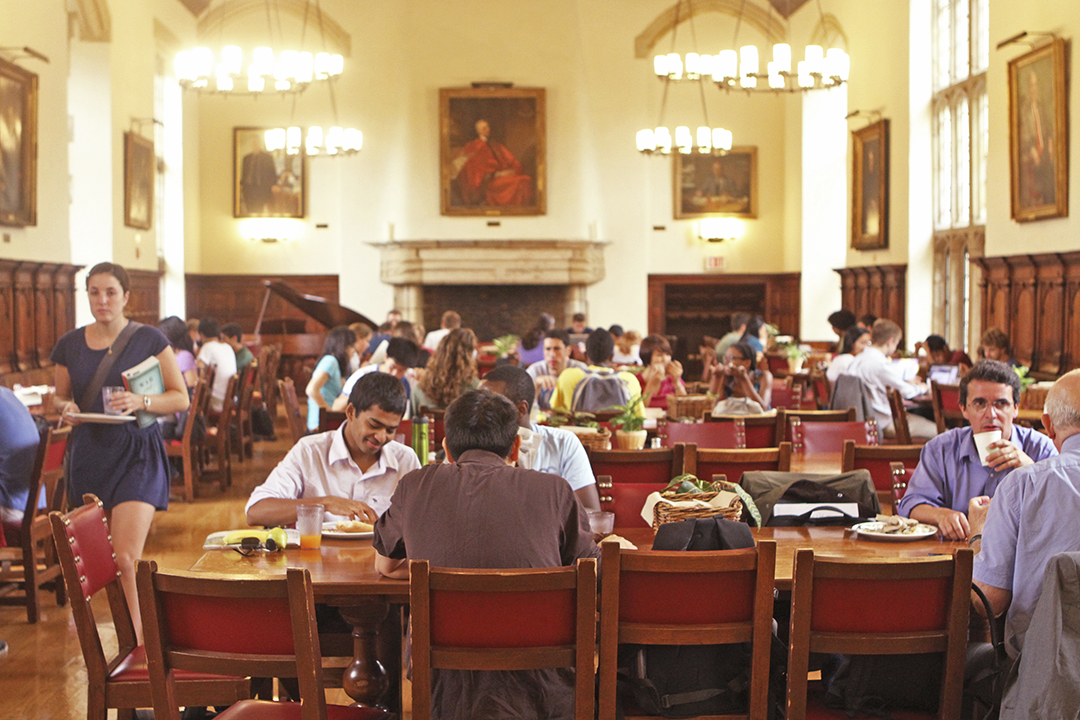YHHAP Fast returns to raise funds for a new group of local organizations
After raising $17,173.81 in the fall, the Yale Hunger and Homelessness Action Project’s student fast will return this semester.

Yale Daily News
In the fall, 1,277 Yale students donated their meal swipes in support of local organizations that seek to alleviate hunger and homelessness in the New Haven area, translating to a total monetary value of $10,087.38. This spring, the Yale Hunger and Homelessness Action Project hopes to do it again.
On April 15, Yale College students can once again choose to donate their meal swipes to be converted into tangible funds given to YHHAP through Yale Hospitality. Between April 5 and 14, students can log in to their SIS account, select the “Dining” tab, and opt-in to waive brunch and dinner swipes for April 15. All donations will then be evenly distributed to the four selected organizations.
“The YHHAP Fast has been a pretty large fixture in the Yale community and things got really unsettled during COVID,” said YHHAP Fast co-coordinator, Paul Douglass ’26. “We are trying to reposition the fast and put it back into a place where it’s a great way for students to contribute to their community.”
To encourage participation, local restaurants will offer Yale students incentives to eat at their restaurants and forego meal swipes on April 15. Sherkaan will offer a 15 percent discount to all participating students. Shake Shack will offer custard to students and a percentage of all proceeds will be donated to YHHAP, while Claire’s Corner Copia will donate directly to YHHAP. While students are strongly encouraged to support these local businesses, Douglass also urged student organizations to host community events to share a meal. Some residential colleges, including Davenport and Branford, will also host college-specific events in support of the YHHAP Fast.
YHHAP works with Yale Hospitality and the University to determine the monetary amount reimbursed per meal swipe. Douglass told the News that although the full day of meal swipes is worth $42, YHHAP only receives $7.89. The coordinators of the Fast advocated for Yale Hospitality to increase the amount and offer transparency as, according to Douglass, “they really don’t break down how they came to that number.”
Dana Courtney, the director of business administration and finance for Yale Hospitality, did not respond to a request for comment.
“Yale is in a very unique position where we have a very tense relationship with the New Haven community,” said Jocelyn Ra ’22, a YHHAP Fast co-coordinator. “Every Yale student wants to contribute to fixing that.”
Organizations that will receive the funds raised from the Fast include New Reach, Sunrise Cafe, Project Access and New Haven Inner-City Enrichment Center. The donations will be distributed evenly among the four beneficiaries. All four are entirely new partners to the YHHAP Fast, according to Ra.
Douglass noted that the selection process was very different.
“We wanted to be very intentional about the organizations that we chose,” Douglass said.
Douglass and Ra worked alongside Jason Martinez — a program manager for the Community Impact Lab at the Yale School of Public Health — to get connected with several New Haven organizations. The co-coordinators then met with six of those organizations and conducted a screening process looking for what Douglass called “a cause that would benefit from [the] donations and have a substantial impact on people day to day.”
New Reach focuses on housing services to help households achieve stability and self-reliance. Sunrise Cafe offers a space for those experiencing homelessness and food insecurity to grab breakfast, rest and connect. Project Access serves to increase access to medical care in underserved New Haven communities. The NICE Center provides several services ranging from food, hygiene and clothing donations to tutoring programs and utility bill assistance.
Located in the community room of the New Haven Police Department station, the food pantry NICE hosts is open once a month and serves about 85 families from the greater New Haven and Connecticut areas. Jamilah Rasheed, who co-founded the NICE Center, hopes to expand to more than once a month but said that the organization is in need of a larger volunteer base and funding for supplies.
The food pantry offers items “beyond canned goods,” Rasheed said, such as hygiene kits to meet the demand for basic necessities as well as fresh produce for more nourishing meals.
“I live in the neighborhood,” Rasheed said. “I see how people struggle to get by.”
Ra added that the organizations the Fast has regularly supported are now better funded and not in as dire need which added to the decision to seek out new organizations. She found this to be a positive as they have watched the organizations “grow into something that’s impactful.”
Steve Werlin at Downtown Evening Soup Kitchen, a beneficiary of the YHHAP fall 2022 fast, spoke on how the Fast and other partnerships with YHHAP aid the organization. He emphasized that the goal is for Yale undergraduates to be engaged with the community in methods that are interesting and accessible to them.
“There are different opportunities to get involved and step outside the Yale footprint,” Werlin noted. “The Fast is one such way that is accessible despite your availability.”
A report released by Connecticut’s DataHaven found that food insecurity in Connecticut nearly doubled in 2022 from 10 percent to 17 percent.







